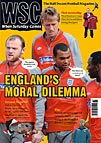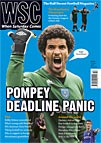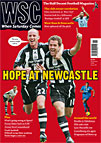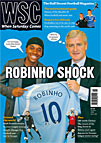 Dear WSC
Dear WSC
In response to my letter published in WSC 275, Mark Brennan Scott accepts that we send someone to each of the weekend’s Premier League games, to commentate live, but not unreasonably asks whether Match of the Day commentators ever “re-record bits they are unhappy with”. Not exactly, but the beauty of an edit rather than a live game is there is scope for tweaking both the sound and visuals by transmission time. Every now and then, a commentator will, for example, misidentify a goalscorer and then correct themselves, in which case we have been known to remove take one in the edit. I’ve found a copy of a letter I had published in WSC 240 in which I said: “If a commentator gets something wrong at the time we may even spare him his blushes at 10pm by removing the odd word.” That remains the case, but most of the time the commentator’s natural reaction works best. If it takes a couple of replays before they identify a deflection or suspicion of handball, that will nearly always feel more authentic than trying to look too clever after the event. In shortening a game for transmission, we may occasionally “pull up” a replay or remove a few words, but would almost never re-record any section of a commentary unless there’s been a technical problem. Furthermore, in all cases the commentators go home after the post-match interviews and a producer back at base edits the pictures and sound recorded at the time. In early days of the Premier League, only two or three games had multi-camera coverage and commentators present, so there were occasional attempts to add a commentary to single-camera round-up games, for example, for Goal of the Month. However, not every commentator was a convincing thespian and one or two “Le Tissier’s capable of beating three men from here and curling one into the top corner. Oh my word, he has…” moments did slip through. With multi-camera coverage and a commentator at every game, that no longer happens.
Incidentally, call us old-fashioned but there was a degree of pride in this office in MOTD’s recent use of “crashed against the timber” as cited in Steve Whitehead’s letter. Better that – or maybe “hapless custodian” – than some unpleasant modern notion like “bragging rights”.
Paul Armstrong, Programme Editor, BBC Match of the Day
Search: 'Werder Bremen'
Stories
 As Federico Bassahun reports, an international striker faces some serious and outlandish accusations
As Federico Bassahun reports, an international striker faces some serious and outlandish accusations
Claudio Pizarro recently completed a permanent move from Chelsea back to Werder Bremen, for his fourth spell at the club since first moving to Europe 11 years ago. However, that was a rare bright moment in a wretched summer for the striker.
 Directors of football are a little-loved breed. Paul Joyce looks at changing attitudes in Germany, where despite successes many clubs now have doubts
Directors of football are a little-loved breed. Paul Joyce looks at changing attitudes in Germany, where despite successes many clubs now have doubts
Kevin Keegan is hardly unfamiliar with outside interference in managerial affairs. His move to Hamburger SV in May 1977 was engineered by one of the Bundesliga’s first general managers, Dr Peter Krohn. A football layman who saw sport as “show business”, Krohn changed HSV’s blue shirts to pink to attract female customers and made the team ride into the stadium on elephants. Viewing himself as more important in the club hierarchy than “overvalued” coaches with “insufficient school education”, Krohn’s meddling meant that HSV finished only tenth in Keegan’s first season.
 Brazil’s quest for Olympic glory fell short once more, adding to the pressure on Dunga in the World Cup, writes Robert Shaw
Brazil’s quest for Olympic glory fell short once more, adding to the pressure on Dunga in the World Cup, writes Robert Shaw
A new film called 1958 – The Year in Which The World Discovered Brazil has the team fondly recalling how the blue shirts worn to beat Sweden in the World Cup final were hurriedly bought at a local shop. The badge of the football federation was then stitched on. Fifty years on and Brazil’s Olympic team turn up to collect their bronze medals with sticking plasters over offending badges – the full national football team wear Nike shirts, while Olympikus sponsor the Olympic team,
What are the expectations for the team?
After the astonishing 2006 World Cup, public expectation is high, especially since Germany had the luck of the draw again and all the big names are in the other half. After all, Germany have won at least one major title in every decade since the 1970s. But then again, the Nationalmannschaft haven’t won a single European finals match since 1996.
Are there any players who have appeared in TV commercials or other advertising?
The national team have been sponsored by Mercedes-Benz for several decades and, for every big event, a TV commercial is produced. This time, the players are dressed in 19th-century climbers’ outfits, crossing the Alps to get to Austria. The idea is semi-funny, but Michael Ballack’s fake moustache brings back memories of the days when a hairy upper lip was obligatory if you wanted to play for Germany.
Is the coach popular?
Joachim (“Jogi”) Löw was Jürgen Klinsmann’s sidekick and said to be the mastermind behind Germany’s new attacking style in 2006. He is good looking (except for his moptop haircut) and articulate, so the public and the media love him. Club officials, however, are unnerved by his continuous criticism of their allegedly outdated training methods.
Which players are good interviewees and who are the worst?
From an interviewer’s point of view, Jens Lehmann is the worst person to talk with. Whatever he is asked, he reacts with a disregard that verges on hatred. A sigh of relief was heard in the press corps when Arsenal’s substitute goalie imposed an interview ban before Germany’s friendly with Switzerland in March. On the other hand, Lukas Podolski’s ability to talk faster than he thinks is always entertaining. He says things like “We must roll up our heads. And our sleeves” or “That’s football. Sometimes the better team wins”.
Are there any players with unusual hobbies or business interests?
Werder Bremen’s Thorsten Frings owned a raccoon until his wife became pregnant. He gave it to a friend, saying a voracious beast and a baby don’t mix. Stuttgart striker Mario Gomez enjoys watching the fish in his aquarium, while Schalke’s Heiko Westermann admits that his hobby is sleeping.
Do any of the players have famous girlfriends or wives?
A few years ago, Lothar Matthäus and Oliver Kahn’s nightclub acquaintances were Germany’s B-versions of Posh Spice. Today, Bastian Schweinsteiger walks in their footsteps. He once invited a girl from a Munich disco to the Jacuzzi in Bayern’s training centre. When they were discovered by the security staff at 2am, he claimed that the young lady was his cousin – which made her famous for about a week.
Are there any players involved in politics?
It’s not evident from the style of football they prefer, but Germany’s central defenders are intelligent and socially committed. Real Madrid’s Christoph Metzelder has started a foundation that seeks to help Turkish kids find their way into German society. Per Mertesacker of Werder Bremen is a devout Lutheran protestant and helps promote the church’s youth festivals.
What will the media coverage be like?
Unfortunately, the pundit partnership of 1970s hero Günter Netzer and journalist Gerhard Delling will disappear from the screen at the end of Euro 2008, because Delling wants to spend more time with his family. For ten years, the two of them were a real life equivalent to the Muppet Show’s Statler and Waldorf. The match commentary will be atrocious, as usual. Worst of all is public channel ZDF’s Wolf-Dieter Poschmann, a former middle-distance runner with a special interest in speed skating who doesn’t have a clue about football.
Will there be many fans travelling to the tournament?
Supporting Germany was left to a small group of Deutschland Deutschland chanting dimwits for many years, but in recent times the national team have become sexy. So there will be masses of – hopefully – gentle folks travelling to the tournament round the corner. In the stadium, the German fans have taken up the English habit of singing the national anthem at the start of the second half. The Austria v Germany match will be accompanied by mutual insults on the terraces.
Karsten Blaas